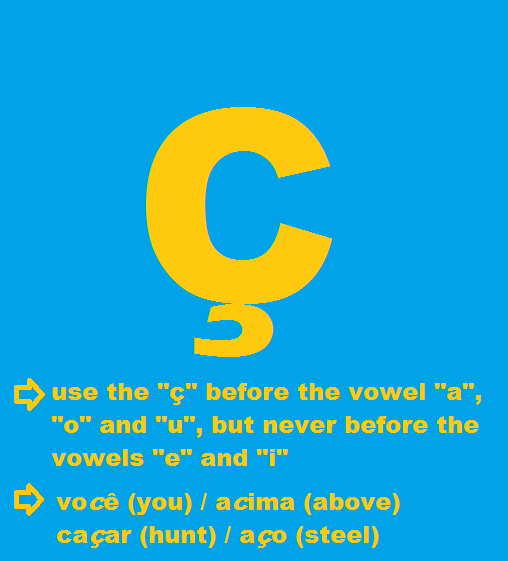The cedilla “ç” in Portuguese Posted by carol on Jun 20, 2016 in Grammar, Learning, Vocabulary
Olá, pessoal! A semana de vocês começou bem? (Hey guys, did you week get off to a good start?)
If you study Portuguese or is just interested in the language, you definitely came upon the character ç at some point. But what does this squiggly line under the letter c mean? The cedilla, known in Portuguese as cedilha is actually a mark under the letter c used to indicate that the pronounciation of the word is more similar to an s (a soft sound) – as in sopa (soup) – than to a k (a hard sound)- as in carro (car).
It is most common in Portuguese, French, and Catalan, and originated in Spain (as a diminutive for the letter z, thus meaning “little z”).
You must find it familiar because of the word façade in English – loaned from French (possibly the only one in the English language).
The ç is only used before the vowels a, o, u – as in praça (square), cansaço (tiredness) – and never before e and i – before those we can just use the regular c as in cidade (city) e certeza (certainty).
Sometimes a verb uses the letter c, but its derivative needs the cedilha:
- agradecer (to thank) – agradeça, agradeço
- comparecer (to attend) – compareça, compareço
- esquecer (to forget) – esqueça. esqueço
- crescer (to grow) – cresça, cresço
- vencer (to win) – vença, venço
- parecer (to seem) – pareça, pareço
- convencer (to convince) – convença, convenço
Agradeça sua vó pelo presente (Thank your grandma for the gift)
Sempre me esqueço de trancar a porta (I always forget to lock the door)
Here are some examples of palavras (words) that use the cedilha:
- coleção – collection
- cabeça – head
- coração – heart
- taça – glass
- abraço – hug
- justiça – justice
- açúcar – sugar
- maçã – apple
- dança – dance
- espaço – space
- endereço – address
- almoço – lunch
- doença – disease
- preço – price
Me dá um abraço? (Can you give me a hug?)
O preço da passagem aumento de novo (The price of the plane ticket went up again)
Você toma seu café com açúcar? (Do you take your coffee with sugar?)
Não tem espaço para todos no meu carro (There’s not room for everyone in my car)
Se eu não durmo bem, fico com dor de cabeça (If I don’t sleep well, I get a headache)
The ç usually appear in words that end with ão
- depilação – waxing
- coração – heart
- manutenção – maintenance
- canção – song
- coleção – collection
- lição – lesson
- construção – construction
- comunicação – communication
- ação – action
- função – function
- atração – attraction
- ambição – ambition
- atenção – attention
- condição – condition
- criação – creation
- direção – direction
- decepção – disappoitment
- devoção – devotion
- intenção – intention
- depressão – depression
- impressão – impression
Ter uma conta de e-mail é essencial para a comunicação (Having an e-mail account is vital for communication)
Minha viagem para Portugal foi uma decepção (My trip to Portugal was a disappointment)
Pay attention to what the teacher is saying (Preste atenção ao que a professora está dizendo)
(Note that many of these words correspond to the word ending “tion” in English – as in action, function, collection)
Note that no word in the Portuguese language ever starts or ends with the character ç.
Uma boa semana e um abraço a todos! (Have a good week and hugs to all)

Build vocabulary, practice pronunciation, and more with Transparent Language Online. Available anytime, anywhere, on any device.





Comments:
Sunanda Bhaduri:
It’s a very useful blog to learn Portuguese. Here is a suggestion if there would be some post showing the use of verb of same meaning but with different application.
Like : falar and dizer ; morar and viver and many more..
carol:
@Sunanda Bhaduri Hey, Sunanda. That’s a great idea. Check out this previous post, it may be related to your suggestion: https://blogs.transparent.com/portuguese/words-with-several-meanings/
Thanks for reading our blog 😀
Juan:
I, a Brazilian, have a tip, the pronunciation of “letter” “ç” is the same as the pronunciation of the word “star” as if it were the pronunciation of the first syllable of the word “second.”
I hope I have helped!